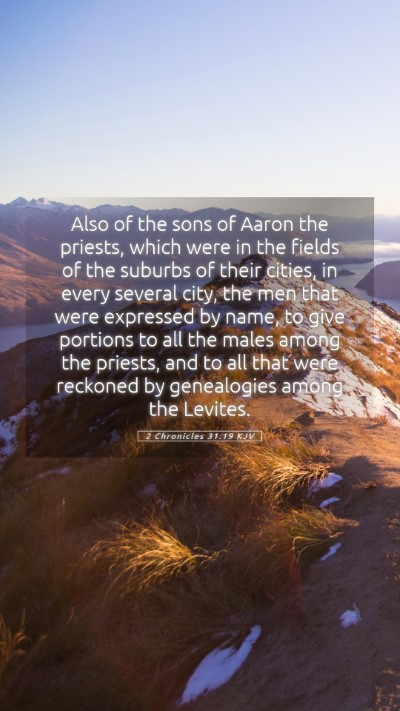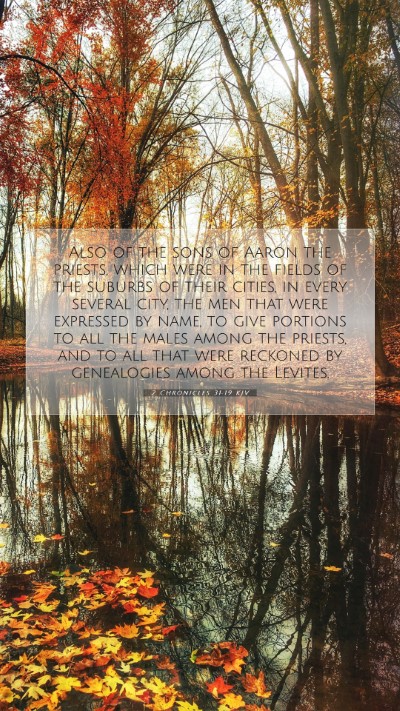Understanding 2 Chronicles 31:19: A Comprehensive Bible Verse Commentary
Verse Reference: 2 Chronicles 31:19
Verse Text: "Also concerning the children of Aaron, the priests, which were in the fields of the suburbs of their cities, in every several city, the men were mentioned by name, to give portions to all the males among the priests, and to all that were reckoned by genealogy among the Levites."
Introduction
In this verse, we see a significant aspect of the organization of the priestly and Levitical systems in ancient Israel. This commentary aims to provide insights into the meaning and implications of this verse, drawing from established public domain commentaries, enhancing our Bible verse understanding.
Exegesis and Analysis
This passage emphasizes the careful attention paid to the distribution of resources and duties among the priests and Levites. The organization of spiritual leaders was not merely administrative but carried deep religious and social implications that are drawn from historical contexts.
Commentary Insights from Notable Scholars
- Matthew Henry's Commentary: Henry highlights the importance of order and organization within the priesthood. He comments on how such arrangements reflect God's command for the sanctity and proper service of the priests. This arrangement implies that the priests and Levites had designated roles in maintaining the worship and sacrificial system of Israel. Henry notes how this distribution was essential for ensuring that the worship of God was conducted decently and in order.
- Albert Barnes' Notes: Barnes elaborates on the specifics of the allotments given to the priests and Levites. He points out the significance of mentioning priests by name to maintain individuality within God's appointed services. This aspect of naming reinforces the idea of accountability among spiritual leaders, advocating for a structured system where each priest had distinct responsibilities. His commentary touches on the historical need for order in the service of worship during King Hezekiah's reforms.
- Adam Clarke's Commentary: Clarke brings a deeper understanding of the genealogical references suggested in the verse. He explains how lineage played a crucial role in determining eligibility for priestly roles. The mention of "genealogy" serves as a reminder of God’s covenant with specific families and tribes (the Levites), asserting their divine right to serve in the temple. Clarke emphasizes that this genealogical record served both as a historical document and as a guide for future leaders within the community.
Historical Context
To appreciate the significance of 2 Chronicles 31:19, one must consider the historical context of the reign of King Hezekiah, who undertook a massive religious reform in Judah. This reform aimed to restore the worship of Yahweh and to eliminate idolatrous practices that had invaded Israelite worship. Understanding this cultural backdrop can illuminate how effectively the distribution of duties among priests and Levites was a reflection of returning to true worship.
Theological Implications
The assigned portions to priests and Levites as stated in this verse carry profound spiritual truths pertinent to modern Bible study insights. The governance and organization of spiritual leaders speak to the orderly nature of God's kingdom. Just as the priests in ancient Israel had specific roles, the church today is called to find order in its leadership and ministry efforts. This brings a contemporary application of diligence and responsibility among church leaders.
Practical Applications
When considering the implications of this verse, it is essential to reflect on how these principles apply to our daily lives and church organizations today:
- Accountability: Like the priests listed by name, church leaders are called to be accountable for their roles, reflecting integrity in their ministries.
- Structure in Worship: The organized approach to worship encourages current churches to adopt similar structures that promote effective ministry.
- Respect for Tradition: Recognition of genealogies serves to remind us of the importance of history and tradition in shaping faith.
Cross References
This verse can be correlated with the following scripture passages:
- Numbers 3:6-10 - Discusses the roles of the Levites in service to the priests.
- 1 Chronicles 24:3 - Details the division of the priestly duties among the descendants of Aaron.
- 2 Chronicles 29:4-11 - Further details the reforms instituted by Hezekiah, emphasizing the restoration of temple worship.
- Hebrews 7:11 - Discusses the priesthood and its significance compared to Christ's eternal priesthood.
Conclusion
2 Chronicles 31:19 serves as a valuable verse in understanding not just the organizational structure of ancient Israel but also the principles of divinely appointed order within community worship. Each commentary contributes to a richer understanding of Scripture, enhancing our Bible verse interpretations and providing practical insights for modern application. Engaging in thorough Bible study offers believers today substantial guidelines for leadership, worship, and the observance of tradition.
As we reflect on the importance of this verse, it encourages us to seek knowledge and understanding in our spiritual journeys, urging us to ask pertinent questions about the significance of Bible verses in a contemporary context.


